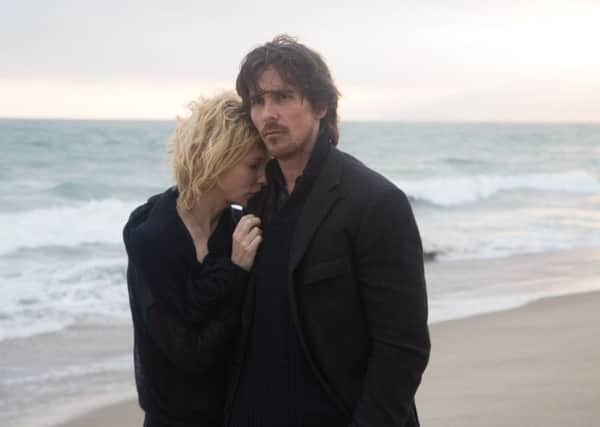Film review: Knight of Cups | Evolution | Son of Saul


When Tree of Life came out five years ago its release was treated like a blockbuster art exhibit. Terrence Malick’s film-a-decade work rate combined with his increasingly impressionistic style inspired plenty of chin-stroking reverie and just as much don’t-get-it derision, but at least it was saying and doing something interesting. Then came To The Wonder and most of that interest evaporated amid Emperor’s New Clothes-style catcalls and legitimate frustration with Malick’s ongoing tendency to treat female characters as wispy ornaments who have all the complexity of a curtain billowing in the wind (another Malick trope).
Fast-forward three years and Malick’s long-since-finished Knight of Cups (***) is slipping into cinemas without much fanfare, though that might not be a bad thing. Another elliptical family saga full of beautiful people ruminating on their existential despair with stream-of-consciousness internal monologues, it sees Malick – working once again with genius cinematographer Emmanuel Lubezki – cutting together gorgeously shot scenes from his characters’ fractured lives in an effort to suggest some kind of meaning without feeding our own addiction to narrative cinema.
Advertisement
Hide AdIt’s not the sort of film that can really bear the weight of too much expectation, in other words, and yet nor is it as annoying as its predecessor. Perhaps because it’s set in LA and revolves around a fantastically well-paid screenwriter (Christian Bale), its vacuity seems as much a comment on the self-regarding nature of the character as it does an arguable fault with the film, particularly since this character is dealing with various relationship problems – a failed marriage, the fallout from family tragedy, potential fatherhood – while living a life of desolate opulence.
That said, the film is also woollier than Malick’s previous work. It’s title and chapter headings derive from tarot cards and rarely does the film suggests Malick wants their significance to be viewed ironically. But there is something intriguing too about his desire to infuse lives that never seem all that worthy with cosmological significance. In the end it functions like a cinematic lava lamp: beautiful and aesthetically pleasing if you’re in the mood to let its abstract images wash over you; faintly ridiculous if you’re not.
There’s more abstract storytelling in Evolution (****). Set on a strange and remote Mediterranean island inhabited by pre-teen boys and their mothers, this horror-tinged tale from director Lucile Hadzihalilovic puts a bold spin on the trauma of adolescence. Though it can be a little maddening at times, the film taps into deep-rooted male anxieties about the female body in ways that are both gruesome and compelling.
There’s plenty of formal invention in this year’s foreign language Oscar-winner Son of Saul (****) as well. A film about the holocaust, it’s necessarily harrowing, but it’s also an audacious piece of filmmaking, one that explores this atrocity with a rigorous visual language to convey its horror in ways that haven’t really been seen on screen before. Zeroing in on a member of the Sonderkommandos – the Jewish prisoners who received special privileges in the camps for aiding in the disposal of gas chamber victims – director László Nemes keeps the titular Saul (Géza Röhrig) in tight focus for the duration of the movie as he becomes obsessed with finding a rabbi to bless the body of a dead boy he claims is his son. This narrowed perspective means we never get a full picture of what’s going on, but we understand from the sounds, the subtitles and the fragments of misery we frequently see on the edge of the frame that Saul’s quest is a quest for redemption. Moreover, the film’s stylistic flourishes are a way of communicating his attempts to simultaneously block out the external horror while reckoning with the inner turmoil he feels while betraying his fellow Jews under impossible-to-imagine circumstances.
On a lighter note, but not necessarily a perfectly pitched one, Florence Foster Jenkins (***) offers up the intriguing sight of Meryl Streep giving a deliberately bad performance. A biopic of the eponymous opera enthusiast whose wealth in New York in the early 1940s enabled her to indulge her delusional quest to perform at Carnegie Hall (little realising that her lack of talent was her chief selling point), the film sees Streep burrowing beneath the easy-to-mock self-belief that’s since fuelled a thousand X-Factor wannabes to explore what was really driving Jenkins. Director Stephen Frears – very much in Philomena mode here – isn’t all that interested in those darker elements, but he finds plenty to sink his teeth into with Jenkins’ relationships with her husband (Hugh Grant) and pianist (Simon Helberg).
Unlike Jenkins, country and western star Hank Williams had plenty of talent, but that doesn’t automatically qualify his feats and flaws – writing hits like You’re Cheatin’ Heart; battling alcoholism most of his life – as worthy biopic subject matter.
Advertisement
Hide AdTom Hiddleston certainly can’t do much with the Stetson-clad singer in I Saw the Light (**), a film that seems more intent on running through the flash-point moments of Williams’s life than illuminating how he managed to connect with so many people while drinking his away his life.
Finally this week, Robinson Crusoe (*) is the film you least want to be stranded in a cinema with your kids watching. A patience-trying adventure story about a desperate-to-spread-his-wings parrot who sees his chance to escape his island home after the eponymous hero washes up with his dog, the film makes little sense, ditching the main thrust of the original story in favour of a Rio-style talking animal adventure.